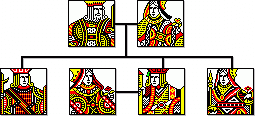Subsystems
We first divide the database design into three parts, Administration, Evidence and Conclusions. The Conclusions part can then further be divided into Interpretation, Results and Common for the elements shared between them.
Administration
The Administration area of the database is the least developed section, only the basic minimum is currently being implemented.
- System
- Manages global settings used by the database.
- Version
- The database version number, used to manage database updates.
- Contacts
- Manages contact information for various parts of the system.
- User
- Handles per user system settings and details of the researchers that have contributed to the database.
Evidence
The evidence section centres around the Reference object which is supported by the Source, Citation and Repository subsystems.
- References
- Document transcriptions, descriptions and notes that make up the evidence.
- Media
- Digital media that supports the References. Currently scans and photos.
- Citations
- Covers Citations and Repositories. Still being developed.
Conclusions
The information presented in the Evidence section is broken down into its constituent parts: Dates, Places, Personas, Names and Eventas. Personas and Eventas are used to glue all these entities back together again and are linked to the Events, Individuals and Families that are the end results of the process.
Common
These subsystems are shared by both the Interpretation and Results.
- Dates
- A subsystem to handle dates, date ranges and date conversions.
- Places
- A subsystem to cover place names and locations.
- Names
- A subsystem that handles name parts and titles.
- Event Types
- Part of the Event subsystem that describes event types and the roles that are involved.
Interpretation
This is the area where the main work is done.
- Personas
- The Persona is the representation of a person as they appear in a reference document.
- Eventas
- The Eventa is the representation of an event as described in a reference document.
Results
The Individuals and Family relationships are the results of the interpretation of the evidence, using various tables to tie things back to the interpretation.
- Individuals
- The Individuals and Family links that result from the interpretation.
- Events
- The part of the Event subsystem that describe the real events we believe occurred.

